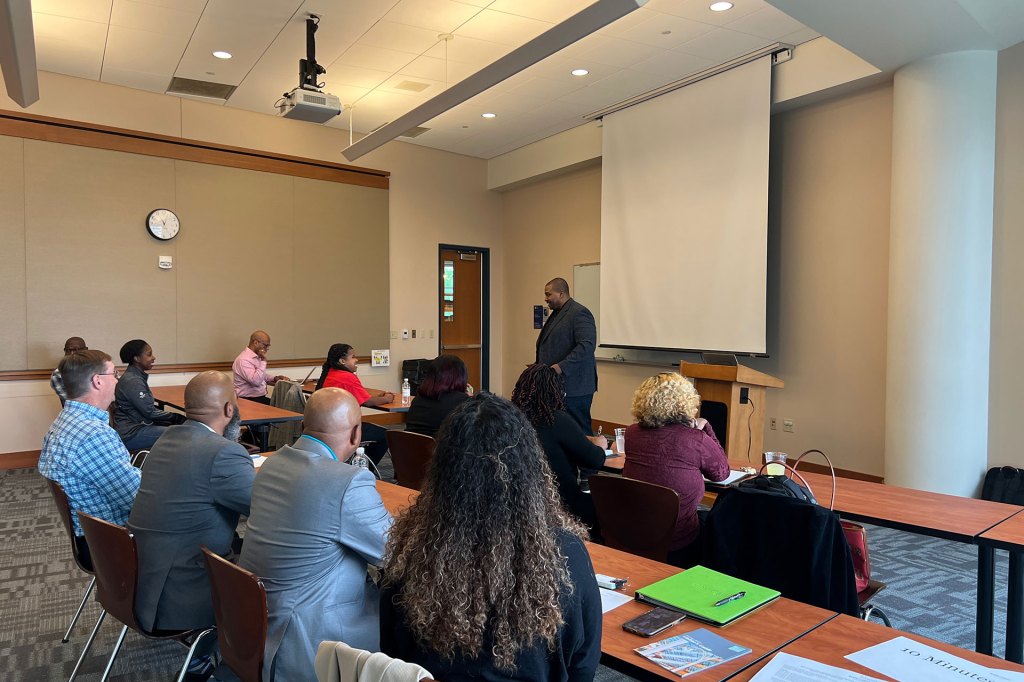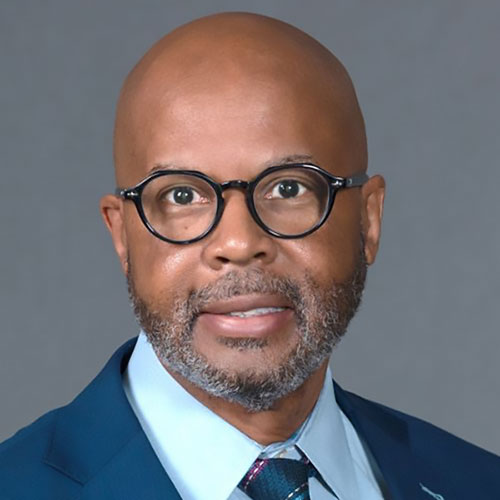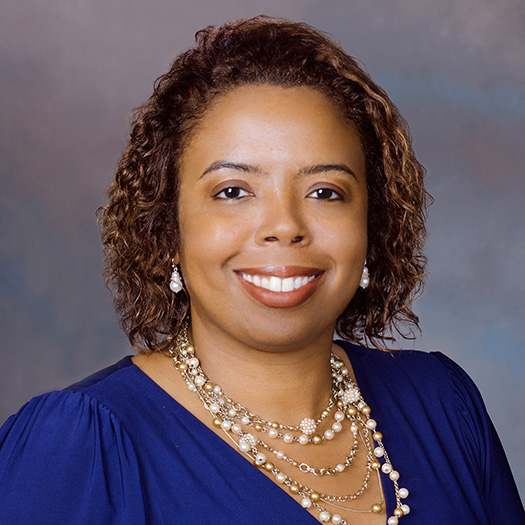According to the Small Business Credit Survey, as of 2021, there are 161,031 Black-owned businesses in the US. These businesses employed over 1.4 million people and generated about $206.1 billion in revenue.
Marshawn Wolley, a Black business owner in Indianapolis, clearly remembers his early years as an entrepreneur providing consulting services to minority-owned businesses. What started as a part-time endeavor grew into a full-time one. When a bank employee encouraged him to apply for a business credit card, he was hopeful about accessing additional credit. But the experience of applying for credit left him with no credit card, many questions, and few answers. “I always paid my bills on time, had good credit, and earned a high, steady income,” he said, “but I was denied by two banks that I had a relationship with for a business credit card without an appropriate explanation.”

“I always paid my bills on time, had good credit, and earned a high, steady income, but I was denied by two banks that I had a relationship with for a business credit card without an appropriate explanation.”
– Marshawn Wolley, president and chief executive officer at Black Onyx Management
A third bank Wolley had an account with increased his credit line without his asking, because they saw he had applied for credit at these two banks.
“I was confused,” Wolley recalled.
Access to credit is crucial for small businesses. It can make a difference between a business’s success and failure. The criteria for approving or denying credit involves many factors. But according to Wolley, experiences like these for Black business owners can discourage entrepreneurs from pursuing credit and taking on debt.
The importance of credit for small business growth and expansion
Each year for the past decade, the Federal Reserve has conducted the Small Business Credit Survey (SBCS). The SBCS captures the perspectives of business owners from across the United States who operate firms with fewer than 500 employees. Reports and analyses produced from the survey responses provide insights into firms’ financing and debt needs and their experiences seeking credit.
According to the recently published 2024 Report on Employer Firms: Findings from the 2023 SBCS, the share of firms that applied for loans, lines of credit, or merchant cash advances declined 3 percentage points between 2022 and 2023, falling from 40% to 37%. Approvals remained mostly steady, and applicants at small banks, credit unions, and finance companies were more likely to be approved for at least some financing than applicants at other sources.
While many businesses use credit to help afford day-to-day expenses, many also reported using financing to grow. Nearly 60 percent reported seeking credit in 2023 to meet operating expenses. Forty-six percent of businesses that applied said that they did so to expand their business, while 41% said they wanted credit for future use as needed. More than half of firms sought some type of financing in the 12 months prior to the survey. Firms most often applied for financing to meet operating expenses.
Reasons for applying, prior 12 months1,2,3
(% of applications) N=3,476
- See Notes and Definitions (PDF) for details on time period definitions used in the SBCS.
- Because of changes to financing questions in the 2023 survey, data on demand for financing in the 2023 survey are not directly comparable to findings from prior surveys. See Methodology (PDF) for more details.
- “Have available credit for future use as needed” was added as a discrete answer choice in 2023. Examples provided for “meet operating expenses” include payroll, rent, and inventory; examples provided for “make repairs or replace capital assets” include vehicles, equipment, and facilities. Respondents could select multiple options. Response option “other” not shown. See Appendix (XLXS) for more details.
While many applicants seek credit to expand their business, not all businesses experience the same outcomes in accessing credit. Results from the 2022 SBCS revealed that startup firms owned by people of color were significantly less likely than white-owned start-ups to receive funding through financial institutions or lenders, despite being likely—and, among nonemployers, more likely—to apply for financing from a lender. Data also reveal that people of color who own startups of color are less likely than their white counterparts to be fully approved for the financing.
Outcomes on loan, line of credit, and merchant cash advance applications
(% of applicants)
Exploring attitudes behind Black debt aversion
Behind this data are stories like the one shared by Wolley, president and CEO of Black Onyx Management, and those of other Black business owners. Black Onyx Management works to build equity in society through research, programs, and managing for equitable outcomes.
“Through my experiences personally and professionally, and through conversations with the community, I heard a lot of frustration [about access to credit],” Wolley said. “I remember hearing someone say, ‘We can get car loans and credit cards, but it’s difficult to get a business loan or mortgage.’”
Wolley, his colleagues Rebecca Shankman and Rashawn Ray, and a client of his company, Equity1821, decided to probe deeper to further understand why Black businesses seem to lack debt. Equity1821, the first Black-led loan fund in Indiana, was launched as a result of a feasibility study to explore developing a CDFI to help meet Black businesses’ credit needs.
The Federal Reserve Bank of Chicago partnered with Black Onyx Management and Equity1821 to explore whether Black businesses in the greater Indianapolis region may have an aversion to debt when seeking capital to increase growth. Previously, the Chicago Fed undertook a similar project in Detroit to better understand sources and uses of funding for Black-owned businesses in that area during COVID-19. These projects in Indianapolis and Detroit reflect the Fed’s commitment to engaging in research and outreach that help illuminate economic challenges faced by low- and moderate-income communities.
Survey identifies attitudes about debt
In 2023, Black Onyx Management administered a survey to 238 Black-owned businesses in Indiana, which gathered 180 responses. The results were analyzed by Black Onyx Management and the Chicago Fed.
“We’ve always been impressed with the Fed’s data capabilities and actually modelled some the questions asked in the Small Business Credit Survey,” Wolley said.
The survey results showed that 72 percent of the 180 businesses considered themselves debt averse. Their reasons ranged from a historical fear of debt to general distrust of the banking system and a lack of knowledge about underwriting and the loan process. The higher the household income and education level of the owner, the more debt averse the business owner seemed. Longer-tenured businesses appeared to be less debt averse.
Debt Aversion Survey Results, Banking: Primary reasons for not applying for a loan
Nearly half of those surveyed expressed that they were unaware of how banks made loan decisions. When asked why a loan wasn’t applied for, nearly 25 percent of the survey respondents didn’t think their application would be approved. Over the life of their business, only 40 percent of respondents reported having received a loan from a traditional bank. And 68 percent did not receive a Paycheck Protection Program loan, a mostly forgivable loan that was distributed during the COVID-19 pandemic.
Discussions shed light on reasons for debt aversion and the need to demystify underwriting
Two focus groups held after the survey results were analyzed included questions about attitudes regarding debt, cultural influences, and knowledge about the loan underwriting process. The discussions highlighted the historical fear of debt and traumas associated with accruing it. Participants cited reasons that included an aversion to any type of debt, the fear of inability to pay back debt, and a resistance to add to more debt already accrued.
Participants also noted a distrust of the banking system based on historically widespread practices like redlining, a discriminatory practice that denies financial services to residents of certain areas based on race or ethnicity.

Participants also shared they had a significant lack of knowledge about the loan process. They didn’t know either what was needed to apply for a loan or the different options available. They also expressed a lack of knowledge surrounding the repayment process. During the focus groups, participants heard from a Black underwriter who shared details about the loan approval process. The banker provided an overview on the types of loan products in the market, what underwriters generally seek during the loan approval process, and the 5Cs of credit: character, collateral, capacity, conditions, and capital.
“While personal debt can be problematic, business debt is like fuel that allows businesses to grow. We’re going to continue to socialize that there’s an opportunity to better communicate with people of color, particularly Black businesses, about debt.”
– Marshawn Wolley, president and chief executive officer at Black Onyx Management
Using education to help demystify underwriting
A post-event survey after the focus groups and the presentation by the underwriter revealed that several respondents felt more confident in initiating conversations about applying for a loan. Others reported that the experience [of hearing from an underwriter] was the first time a bank had initiated the conversation about the business loan process. One participant would eventually obtain a business loan to hire staff for their business.
The post-event survey also revealed that participants felt they had a better understanding of the underwriting process, clarity that has helped them prepare data and documents needed to be loan ready. Respondents have also been sharing what they’ve learned with their larger networks of Black business owners.
Wolley said Black Onyx Management and its partners plan to take a pilot program about underwriting and turn it into a curriculum. He noted there’s also an opportunity to help business owners distinguish between personal debt and business debt.
“While personal debt can be problematic, business debt is like fuel that allows businesses to grow,” he said. “We’re going to continue to socialize that there’s an opportunity to better communicate with people of color, particularly Black businesses, about debt.”








